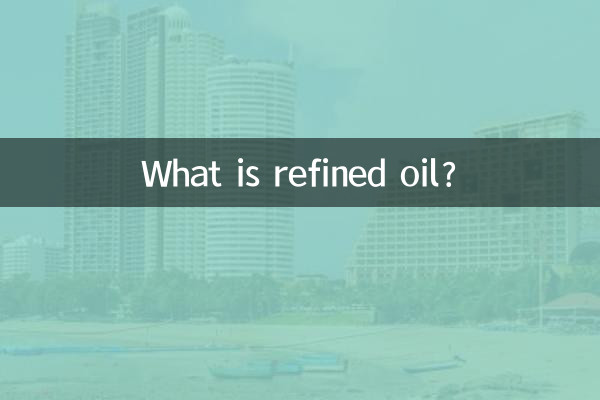What is refined oil?
Refined oils have become increasingly common in the food industry and home cooking in recent years, but many people are unclear about their specific meaning and characteristics. This article will combine the hot topics and hot content on the Internet in the past 10 days to introduce in detail the definition, production process, advantages and disadvantages, and common types of refined oil to help readers better understand this edible oil.
1. Definition of refined oil

Refined oil is edible oil that has been purified, bleached, and deodorized from crude oil (i.e., unprocessed vegetable oil or animal oil) through physical or chemical methods. The refining process is designed to remove impurities, free fatty acids, colorants and off-flavors, improving the stability and taste of the oil.
2. Refined oil production technology
The production of refined oil typically involves the following steps:
| step | describe |
|---|---|
| Degumming | Remove phospholipids and other colloidal substances from oil |
| Deacidification | Neutralize free fatty acids and reduce acid value |
| decolorization | Use activated clay or activated carbon to absorb pigments |
| Deodorize | High temperature distillation removes odors and volatile substances |
| winterization | Low temperature treatment removes solid fat and improves low temperature stability |
3. Advantages and Disadvantages of Refined Oil
Refined oil has the following advantages and disadvantages due to its processing technology:
| advantage | shortcoming |
|---|---|
| High smoke point, suitable for high temperature cooking | Some nutrients (such as vitamin E, phytosterols) may be lost |
| Clear color and neutral taste | May contain traces of chemical residues (such as solvents) |
| Long shelf life and good stability | Some natural flavors are removed |
4. Common types of refined oils
According to different raw materials, refined oil can be divided into the following categories:
| type | Features |
|---|---|
| Refined soybean oil | Inexpensive and suitable for frying, but has a higher proportion of Omega-6 fatty acids |
| Refined rapeseed oil | High in monounsaturated fatty acids, suitable for Chinese cooking |
| Refined palm oil | High temperature resistance, often used in processed foods, but high in saturated fatty acids |
| Refined sunflower oil | Rich in vitamin E, suitable for cold or low-temperature cooking |
| Refined olive oil | Retains some nutrients, but the price is higher |
5. Hot discussion on the Internet: Is refined oil healthy?
In the past 10 days, the discussion on the health of refined oil has become a hot topic. Supporters believe that refined oil is safe and stable; opponents emphasize its nutrient loss and processing risks. Expert advice:
6. How to choose refined oil?
When purchasing refined oil, you can refer to the following data:
| index | Premium standards |
|---|---|
| Acid value | ≤0.2 mg/g |
| peroxide value | ≤0.25g/100g |
| color | Clear and transparent, no suspended solids |
| smoke point | ≥200℃ (suitable for frying) |
In summary, refined oil is an important product of the modern food industry. Only reasonable selection and use can balance health and deliciousness. Consumers should scientifically combine different oil products based on cooking needs and nutritional considerations.

check the details

check the details